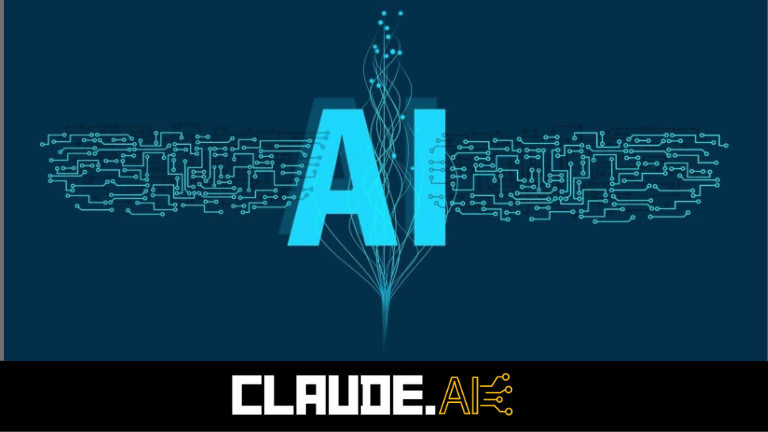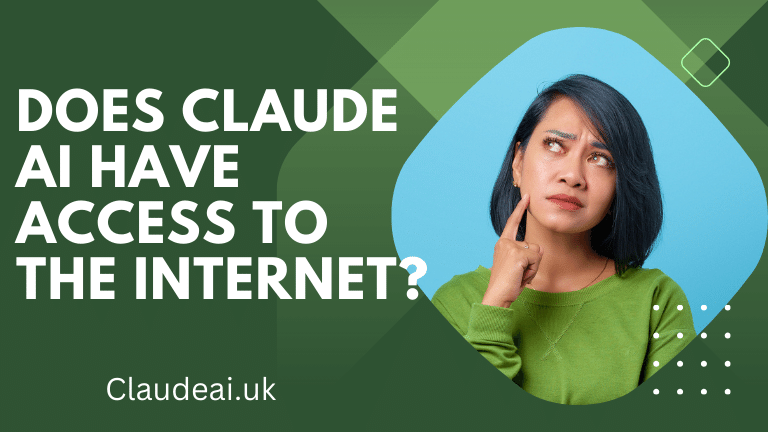Does Claude AI have access to the internet? Claude AI is an artificial intelligence created by Anthropic to be helpful, harmless, and honest. As an AI system without direct access to the internet, Claude does not have the capability to browse the web or search engines on its own. However, Claude can be provided with specific internet content by its trainers at Anthropic in order to expand its knowledge.
How Claude AI learns
Claude AI is trained through a technique called constitutional AI. This involves teaching Claude fundamental principles of reasoning and ethics, rather than having it learn patterns from large datasets scraped from the internet. The goal is to create an AI assistant aligned with human values and safety.
Some key aspects of how Claude learns include:
- Self-supervision – Claude is trained to perform a wide variety of tasks and learn from its own experience completing them. This allows it to build general skills.
- Human feedback – Claude’s trainers provide ongoing feedback, corrections and new information to improve its capabilities. This ensures its knowledge grows properly.
- Limited internet access – While Claude does not browse the web directly, trainers can selectively provide internet content that teaches Claude about the world in a safe, controlled way.
- Simulated environments – Claude is trained through trillions of iterations in controlled simulated environments before being ready to be helpful in the real world.
- Alignment techniques – Special techniques are used during training to align Claude’s goals and values with human well-being. This makes it helpful, harmless and honest.
The end result is an AI system with broad knowledge and skills, but without the risks that come from uncontrolled exposure to the entirety of the internet.
Claude’s knowledge sources
As an AI with limited internet access, Claude gains its knowledge from the following sources provided by its trainers:
- Carefully curated datasets – Claude is provided datasets across many knowledge domains like science, history and culture. These datasets are carefully filtered to avoid harmful content.
- Human demonstrations – Trainers show Claude how to perform new tasks and provide demonstrations. This helps Claude learn interactively.
- Simulated environments – Virtual environments allow Claude to gain knowledge through billions of simulated interactions to learn how to be helpful.
- Feedback from users – As Claude interacts with real users, their questions and feedback help expand its knowledge in a safe way rooted in actual user needs.
- Updates from trainers – Claude’s trainers continuously provide new information and corrections to add to its knowledge base. This ensures its knowledge stays current.
The knowledge sources focus on general skills and reasoning abilities rather than specific facts. This allows Claude to have knowledgeable conversations on a wide variety of topics, without needing the entire internet.
Limitations from lacking internet access
Claude AI’s lack of direct internet access does impose some key limitations:
- No web browsing – Claude cannot freely browse websites or search the internet like a typical AI assistant. Its knowledge comes only from curated sources.
- Limited up-to-date info – Without live internet access, some of Claude’s knowledge may not be fully up-to-date on very recent events and facts. Updates come only through its trainers.
- Reduced scope of knowledge – While Claude aims for broad knowledge, not having full internet access means some topics and niche information may be missing or more limited compared to other AI systems.
- May lack local/personalized data – Claude is unlikely to have knowledge of local events and personal user data like calendars, email, etc. without permissions.
- Slower learning – With no independent web access, Claude’s learning is slower and more dependent on trainer updates rather than real-time internet knowledge extraction.
However, these limitations are deliberately chosen by Anthropic to ensure Claude AI has no ability to browse harmful content or unsafely extract data from users. The focus is on creating a helpful, harmless assistant.
The role of internet access in AI safety
Most AI systems today are trained through scraping massive amounts of data from the internet. However, this approach comes with significant risks:
- Exposure to dangerous content – Unfiltered internet data exposes AIs to harmful content like conspiracy theories, fake news and more. This can pollute AI systems.
- No control over knowledge sources – Undirected web access means AIs ingest information from unverified sources spreading misinformation.
- Extraction of private data – Unconstrained AIs can invade user privacy by scraping personal info online without consent.
- Promotion of harmful goals – Self-directed internet access allows AIs to optimize for dangerous incentives like social media addiction.
- Enabling deception & manipulation – Unclear how systems trained through web scraping interpret and represent knowledge.
By forgoing unfettered internet access, Claude AI avoids these risks in order to prioritize ethical goals like truthfulness, avoiding harm, bias reduction and respecting privacy. Selective knowledge sourcing focuses learning on broadly helpful skills rather than maximizing narrow metrics.
Internet access remains a double-edged sword when training AI systems. While essential for building capabilities, uncontrolled access also opens up dangers. Thoughtfully constrained internet usage combined with techniques like constitutional AI may point the way to realizing benefits while reducing risks to human values.
Alternatives to direct internet access
To overcome the limitations of a system like Claude AI lacking internet access, researchers are exploring alternative approaches:
- Abstract knowledge models – Having AI learn comprehensive knowledge representations not tied to specific internet data sources.
- Improved simulations – Generating a wider range of training environments and data within controlled simulations.
- On-device knowledge curation – Devices dynamically selecting safe, relevant internet information to locally cache for AI training.
- Federated learning – Sharing knowledge representations between distributed AIs without sharing raw internet data.
- Limited API access – Allowing AI systems restricted access to key internet APIs under human oversight.
- Differential privacy – Techniques to better leverage internet data while preserving user privacy.
- Contextual recommendation – Having human trainers selectively provide internet information relevant to an AI’s specific needs.
The goal remains finding the right balance between providing AIs the broad knowledge needed to be capable assistants, while avoiding the risks of unfettered internet access. Further breakthroughs in the safety and interpretability of knowledge transfer mechanisms will be key.
The future of safe internet-connected AI
Responsibly connecting AI systems to the wealth of knowledge on the internet remains an active challenge. But managing the risks involved will be crucial as AI capabilities continue advancing.
Key priorities for the future include:
- Transparent knowledge sourcing – AI providers clearly documenting internet vs non-internet data sources.
- Auditing and monitoring – External audits of providers’ internet usage, scraping and curation processes.
- Secure enclaves – Technical controls to restrict how AIs can query internet data.
- Ethics review processes – Oversight bodies to assess responsible vs risky internet-informed AI training.
- User consent policies – Governing how user data can be incorporated into training.
- Explainability and logging – Improving abilities to interpret what internet-trained AIs know.
- International cooperation – Aligning global norms for responsible development of internet-connected AIs.
With great power comes great responsibility. As AI capabilities grow exponentially, continuing to innovate methods for safely leveraging the internet’s knowledge will ensure humanity can benefit from both.

FAQs
1. Does Claude AI have unfiltered access to the internet?
No, Claude has selective, limited access to internet content provided by its trainers at Anthropic. It does not browse websites or search engines.
2. Can Claude AI search Google?
No, Claude cannot directly search Google or any other websites, as it does not have open internet access.
3. What kind of internet access does Claude have?
Claude’s trainers provide specific internet content to expand its knowledge, in a controlled, curated manner. But Claude cannot freely search or browse the web.
4. Does Claude AI scrape data from the internet?
No. Claude is trained on curated datasets and through human feedback, not by scraping information from websites.
5. Can Claude AI visit social media sites like Twitter or Facebook?
No. Claude’s trainers at Anthropic do not provide direct access to social networks during training.
6. Can I give Claude my passwords to access my email, bank accounts, etc?
No, for privacy and security reasons, users should not share personal passwords with Claude or any AI system. Claude has no ability to independently log into private accounts.
7. Does Claude have access to all the data on Wikipedia?
No. While some Wikipedia content may have been used in Claude’s training, it does not have full access to browse or search Wikipedia directly.
8. Can Claude read the news online?
Claude cannot browse news websites directly. But trainers may incorporate select news content for education purposes.
9. Can Claude be connected to the internet in the future?
Anthropic has no plans to give Claude open internet access, to avoid risks from unfettered data collection. Limited API access may be evaluated under oversight.
10. Does Claude absorb biased or dangerous information from the internet?
No. Claude’s limited internet access is carefully filtered to avoid absorbing unsafe content during training.
11. Can Claude learn about my personal browsing history?
No. Claude cannot access any user’s personal browsing history or read their local device data.
12. How does lack of internet access limit Claude?
It depends more on trainers for updates, learns more slowly, and may have gaps in niche or current event knowledge.
13. Could Claude spread misinformation without internet access?
Unlikely. Limited access reduces Claude’s risks of absorbing then spreading false information.
14. Does Claude use any internet access at all?
Yes, trainers provide select internet content. But comprehensive security controls limit its access.
15. Will Claude ever get full internet access?
Unlikely, as Anthropic prioritizes training Claude safely over enabling unfiltered internet usage.

